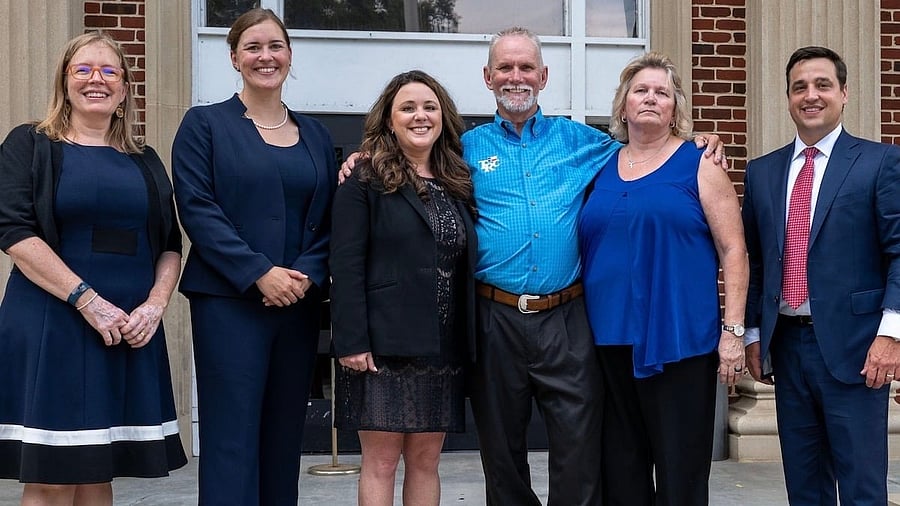
Dennis Perry (fourth from left), who was wrongly convicted and imprisoned.
Credit: www.georgiainnocenceproject.org
Nearly 40 years after Harold and Thelma Swain were shot to death in a small church in Camden County, Georgia, and after a man was wrongly imprisoned for nearly two decades over the crime, authorities arrested another man who they believe murdered the Swains.
The man, Erik Kristensen Sparre, 61, of Waynesville, Georgia, was charged with two counts of murder and two counts of aggravated assault in the 1985 deaths of the Swains, the Georgia Bureau of Investigation announced Monday.
Dennis Perry, who is now 62, was convicted of two counts of homicide in 2003 but was released in 2020 after his conviction was overturned, in part because reporting by The Atlanta Journal-Constitution cast doubt on an alibi that Sparre had used when he was investigated after the killings.
Sparre was arrested in Waynesville, about 90 miles south of Savannah, Georgia, at a store near his home without incident, according to the Bureau of Investigation. He was booked into the Camden County Jail. The Bureau of Investigation declined to comment further.
After a Bible study session in 1985, Harold Swain, 66, and Thelma Swain, 63, a married couple, were killed in the vestibule of the Rising Daughter Baptist Church in Waverly, Georgia, about 14 miles southeast of Waynesville.
Investigators contacted Perry after receiving a tip, learned that he had been working hundreds of miles away in the Atlanta area around the time of the killings, and cleared him.
Sparre was a person of interest early in the investigation, but he was dismissed after a person purporting to be his boss told authorities that Sparre was at work at the time of the killings, according to the Journal-Constitution, which reported that it could not verify the supervisor's identity.
The case went unsolved until 2003 when Perry was convicted of the killings in large part because a woman testified that she had heard Perry say that he was going to kill Harold Swain. Crucially, Perry's lawyers said the jury that convicted Perry of two counts of homicide was not told that the woman had received $12,000 in reward money.
The case against Perry was subject to scrutiny over the years as advocates questioned whether there was enough evidence to convict him. Some strands of hair attached to glasses that were left at the crime scene did not match Perry's DNA.
But the case was not reopened until May 2020. The Journal-Constitution published an award-winning investigation called "An Imperfect Alibi" that questioned whether Sparre's boss had really verified Sparre's attendance at work on the night of the killings. The reporting compelled the Georgia Innocence Project to get a hair sample from Sparre's mother to see if she was related to the person whose DNA was left at the crime scene. It was a match.
Attempts to reach Sparre and two family members were not successful. No lawyer was listed for Sparre.
Sparre had previously told the Journal-Constitution that he was innocent. Perry could not be reached for comment.
"I never gave up hope," Perry said in a previous comment. "I've always been innocent, and that's what I tried to tell them. People don't want to listen."